Filmmaker Marie Jamora makes her mark in Hollywood
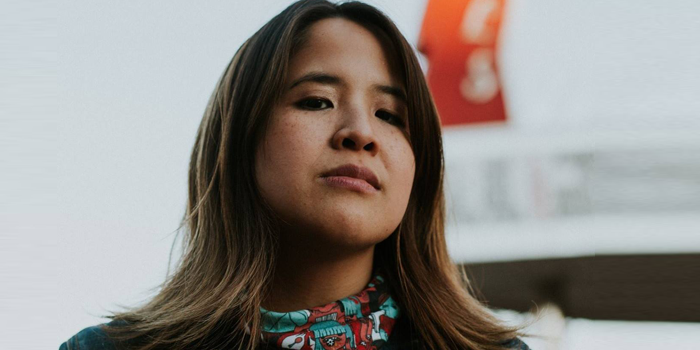
Los Angeles — For someone who started playing with her father’s Sony V8 camera at seven years old, Marie Jamora has gone a long way.
The Ateneo de Manila University filmmaking alum is helming Hollywood shows like “The Cleaning Lady,” “Good Sam,” and “All Rise."
We asked the petite and charming filmmaker, who started in the Philippines doing music videos, what are the challenges she encountered as a woman of color working in Hollywood.
She replied, “As a woman of color and somebody who is under five feet, they always don't assume that I'm the director. So going on to a set and being confident and being very good at the job and proving every day that I deserve to be there as the role of the director is actually a big challenge.”
“A funny story, just yesterday I was working with a pretty new crew because we were working on multiple units, and somebody asked me for the batteries for the sound techs. And they go, "Do you know where the batteries are?" And I said, "No, I don't because I'm the director." They thought that I was a PA.
“So, that's something that I have to encounter pretty often, but it was something that I didn't encounter when I was shooting in the Philippines, because in the Philippines they were very used to female directors. So, only in moving to America, I had to get used to people assuming things because of my appearance and having to prove to them through the work that I deserved to be there.”
Marie, who did commercials, accomplished a feature film (“Ang Nawawala”) and had a stint at “Eat Bulaga,” moved to Los Angeles in 2013.
She talked to us virtually and below are excerpts of our conversation with her:
Congratulations on all your directing projects. I know you just directed an episode of Fox's “The Cleaning Lady” that features a Filipino family, CBS's Good Sam, where you featured the Filipino character and you're doing an episode of “All Rise,” where Reggie Lee is starring as well. Can you talk about these projects?
Yes, I shot “The Cleaning Lady” last year, September and October in Albuquerque. It was really wonderful because it was the first time I got to see sets for Filipino characters and got to even give input.
There's a scene —it came out on Monday, actually— and there's a scene where Fiona cooks adobo, and that's a little bit of me putting a bit more Filipino culture. She's even watching a Teleserye and I asked them, the producers as well, if she could do that. So, it was really wonderful having them be so open to featuring Philippine culture.
For “Good Sam,” we shot that in Toronto, in December, and there's a beautiful gala. The episode's coming out, actually, in Feb 23.
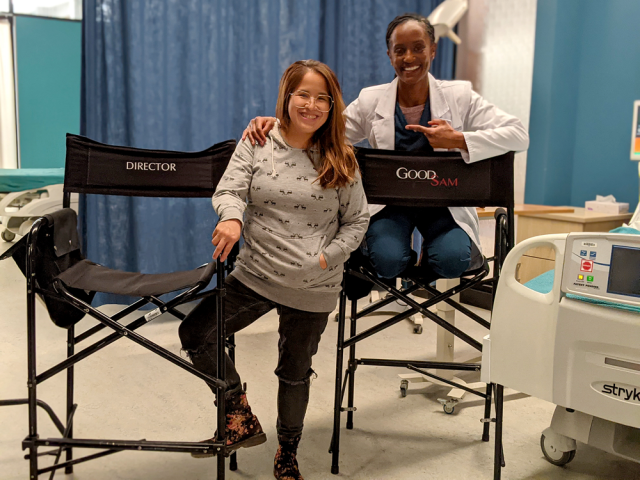
So in the gala, there is a Filipino character there and I was very happy that they were open to ethnicities for this character. He was the best person for it. So, I was very happy to at least have one Filipino character, because Filipinos are everywhere. They are all over the world.
For “All Rise,” I just wrapped shooting late last night. In my job interview for it, I told them, I was so excited to work with Reggie Lee; he's Filipino. And they were like, "Oh, he's actually going to be in a different TV show, but he would've loved it if you were there." But I got to work with Ruthie Ann Miles who played Imelda in “Here Lies Love,” and it was quite wonderful to meet her and get to work with her too.
Do you think Hollywood is changing and opening up more doors to women and women of color in all aspects of filmmaking?
I completely agree. I am proof positive that Hollywood is open to having female directors, directors of color. I am not American. I'm from the Philippines. I'm born and raised in the Philippines. I'm a green card holder. Getting these opportunities is really proof that Hollywood is open to that.
Can you tell us how you started as a filmmaker? I read that your father used to have a Sony V8 camera, and you used to play with it and record everything.
That is completely true. My dad, he loved movies and he actually had a Super 8mm film camera. But unfortunately, he gave it away before I could play with it. So, he got a Sony V8 and that's the piece of machinery I got to play with when I was, I would say, around seven years old.
I remember being in my Lola's house in Taft Avenue and I would make videos. I would just go from room to room and do voiceovers. That was, probably, the first thing I ever shot.
Then I started making videos for high school. When I found out that I could actually make a video as a project and not make a paper, I started making more videos. So, I would make a sci-fi video for one class, and then for another class I would make a Claymation with molecules for chemistry class. So that's where I really started. Then that's how I realized I wanted to take up film in college.
I went to Ateneo de Manila University, where I took up filmmaking. I studied under Uro de la Cruz and Marilou Diaz-Abaya, and was mentored by Tita Marilou very closely. She actually encouraged me to go study film abroad.
Then when I studied film abroad, I would come home and she would check up on me, pretty much until she passed away. She was really important to my formative years. I watched her onset and because I saw the types of movies that she made and how passionate she was about them, she became a role model for me.
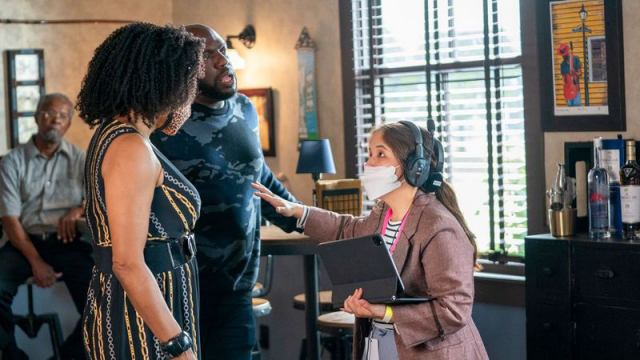
Then in college I was a musician. So, I started with music videos, because all my friends were in bands, and they asked me to make their music videos. Those bands ended up being Itchyworms, Sandwich, Ciudad and then even the Eraserheads. My first music video was for the Eraserheads.
You mentioned making music videos. What did the Philippine experience teach you?
Directing in the Philippines, and I've shot hundreds of things like 50+ music videos, commercials, TV and Project Runway Philippines. So in being on these hundreds of sets with all kinds of budget levels, all kinds of difficulties, like sometimes they'll say, "You don't have money." And then I'll be like, I'll figure out a way. Or sometimes they'll say, "Here is all this money."
I worked on 16mm film on a Bamboo music video. All these challenges and budget levels really trained me to be prepared for everything and anything.
Now getting the opportunity to work on these big Hollywood TV shows, if there's a challenge, I'm unfazed by it. I'm like, "It's fine. I've done that. We can figure it out." Because if I can shoot in a bat cave in a storm or shoot during typhoon Milenyo, I can shoot anything here.
Bamboo - Truth from Marie Jamora on Vimeo.
One of your teachers at Columbia University was the late Philip Seymour Hoffman. Talk about him. How was he as a teacher? What kind of subject did he teach, and what did you learn from him?
That's a great question. He just finished shooting “Punch Drunk Love,” and he was directing a play in New York. He had time to teach. They wanted a class and even if we were 72 students, he only could have 12. They said it was by lottery, but the teachers chose who would be in his class. I was really lucky to be one of the 12.
He taught “Directing the Actor” and he taught us how to speak to actors and how to really transform a scene into something that would be spectacular.
Our first assignment was to show him our work so he could understand our style. We showed him what we shot over the summer. I shot a short film in the Philippines called “Quezon City.” It was about a crime syndicate.
I showed him my opening scene and it was all in one shot, it was with Julia Clarete and Jeffrey Quizon. He actually pinpointed a part of the scene. He said, "What did you give your actor at the end of the scene?" I said, "Oh, actually, the scene ended a little bit before that, but I like what she did at the table. So, I extended the edit of the scene."
Then he said, "You know, I sensed a sort of, generalness to her performance. So, you could actually cut the scene earlier because the scene is really good work."
When he told me, "really good work," I jumped up in the air. I couldn't help myself because I was such a big fan of his. He also encouraged us to find new work, because usually film school says you just get a scene from an old film and direct it. But he was like, "I don't care if it's an old film, if it's your own work, if it's from a comic book, I don't care. Bring it in."
So, I brought a scene in from “Franny and Zooey,” which is a J. D. Salinger book, which we had two weeks with actors to rehearse.
It's supposed to be funny, but my scene wasn't funny. It was just fine. But he watched it and then he told the actor, "You know when you're bragging to somebody? You're trying to impress somebody, you don't actually brag. You have to pretend it doesn't mean anything to you."
He started doing that and the scene became hilarious. I realized how to find something, not the first layer of the scene, but something deeper within that scene. I've taken that within all my work and have been fortunate enough that actors have really responded to the way I direct them.
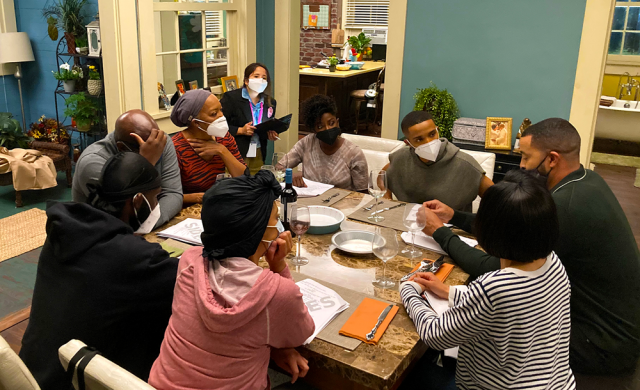
You used to be a drummer too. Do you miss that kind of life? Are you planning to do a musical next or a Filipino sitcom?
I live in an apartment, so unfortunately, I cannot drum here because the neighbors will complain. My husband is very sweet. He bought me an electric drum set, but it's not the same. It doesn't really feel like you're playing drums. So, I hope one day to get a drum kit here and be able to have a band and everything.
But in the meantime, my next job is to direct an episode for “Grease: Rise of the Pink Ladies.” It's a prequel on Paramount Plus and it's a musical, song, dance and everything. I'm really happy because the work that I actually write and direct here are all music films. So, to be able to work on a TV show that is a musical is a dream come true.
I usually attend Cinemalaya Film Festival every year, but the pandemic stopped that for a few years, and you've been part of the Cinemalaya Film Festival. What are the things you discovered being part of that and the new filmmakers that are coming up?
I haven't really kept in touch with, like maybe the last seven years of Cinemalaya, but my own experience being part of that group was transformative because, they gave us a seed grant for the film.
But in getting that belief and the foundation behind you, we got to apply to the NCCA (National Commission on Culture and the Arts). They gave us money for post-production. We found more producers. The caliber of actors that got to be in our film was fantastic. I got Dawn Zulueta and Boboy Garovillo, and of course Felix Roco and Dominic Roco to be the leads. Cinemalaya was really with us since the script phase.
They gave really great notes and the push and pull of creativity versus — because they said there was too much English in my script, which I think is really funny. But I do feel that we did even out the language a little bit and at the same time, I was very happy to stick to my guns.
Cinemalaya was so formative because I met so many great filmmakers that ended up really becoming the next wave of filmmakers.
For example, Isabel Sandoval, who's doing amazing work here, was my batch. Literally we were all in the press cons together and everything. Also, Gino Santos, Carlo Mendoza, and Darlene Malimas, all these people who I met at the festival I've kept in touch with until now. So, I do feel that festival was so special at the time.
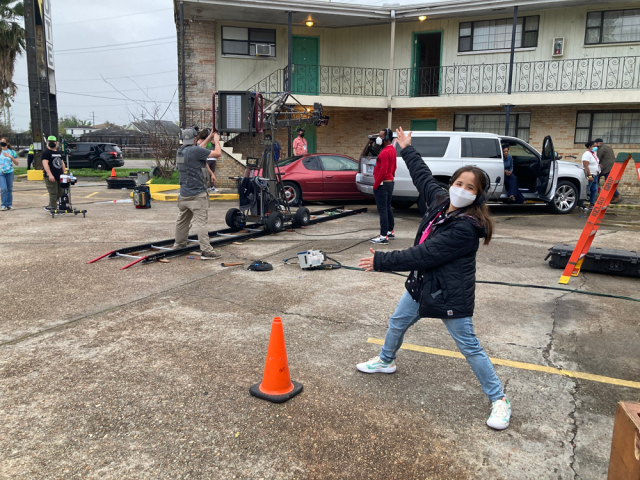
You are also the first Filipino director to be accepted in the American Film Institute's Directing Workshop for Women and being on the faculty of AFI. Tell us why this is so significant for Filipino filmmakers.
AFI is such a pillar of cinema in the United States, so respected and the greatest filmmakers have either spoken or taught or came through that film school. Being the first Filipina from the Philippines to be accepted in their workshop and also teach, I think it's historically significant. For example, they're making a list of 100 greatest films by female filmmakers. I looked at the list and I said, "Why is there no Marilou Diaz-Abaya here? Like she's been making films since the late seventies, early eighties, you should include like at least one." Then I would send them the links to her films.
Also, being a teacher and having the students see another person of color teaching is special for them too. They tell me that. They go, "It's really important to have faculty members who are people of color." And immigrants. And because I do think that adding that layer to this institution that has been so formative in Hollywood for hundreds of years, it's important for people of color to be there and to share our voices and our stories.
Being a faculty member, you also have a hand in the admissions process. It's the next bunch of filmmakers. I love reading the statements from filmmakers all over the world and seeing who would benefit from this institution and become the future of cinema.
Talk about your Cinema Sala platform and why you felt there was a need to organize this.
When I was living in the Philippines, we had a very special group of friends called “Prod Madnezz.” We were maybe, I would say 50 filmmakers, from cinematographers, writers, directors, and more. We would all watch movies together and we would share each other's film and we would pitch each other stories.
When I moved to LA, I didn't have that. I only knew around five filmmakers. I wanted to make my own “Prod Madnezz” here. I invited those five filmmakers to this living room, this sala, where we have this is projector. I would show their films and we would have a potluck. I would ask them questions. Then, from that, it just started to spread, more people like, "Hey, I have a friend, they're a filmmaker, too. They made a film, it got into this festival." Then I invited more and more people. Five people became 15, 15 became 50, and then they couldn't fit in our living room anymore.
Visual Communications invited us to their sala in Little Tokyo. It was great because we could expand and have more filmmakers. We even had speakers come in and had different people to curate. We got to see that there's a huge community of Filipino filmmakers.
Most of the time they didn't know of each other. They'd all been working for 10 years, and didn't know of the existence of the other person, and this was a place for all of them to meet and to collaborate. We're still doing until this day. I have to say from 50, I would say, we're over a hundred and counting. There's just more and more beautiful work being spread. It's great to be able to either see it here first or meet them afterwards.
What are your dream projects right now?
Whoa, that's the hardest question. I would really love to have a Filipino TV show. Actually, we're pitching a TV series right now and it's based on a short film that I made a couple of years back called “Flip the Record” about the real-life DJ scene in the Bay Area in the eighties and nineties. To be able to create Filipino content for American mass media is a real dream. Whether it be a feature film or a TV show.
I have a production company called “Indie Pop Films” and we're actually producing an LGBTQ+ rom com, a Filipino-American one co-production along with Anima (Globe Studios).
I'm very excited about that, because it's not just about my work, that's all about mentoring other people so that we can have more content out there.
What would you advise young, aspiring women filmmakers who would like to follow your footsteps?
I would just say, "Shoot a lot of things and experiment, because when you realize what your voice is, what you love making and what is uniquely you, that is what people will notice"
For me, all my experience in the Philippines, making all those music videos, making all those commercials, it got me to experiment with all kinds of genres. It made me see that I love just stories with music, stories with women, or the struggles of people of color.
Also studying made me confident. Studying in film school and having postgraduate made me confident in my craft. But you don't have to go to film school. You just know yourself. So you should know if you need film school or if you prefer to have experience on set. I knew myself. I love school. I knew I wanted to go to film school.
If you're passionate about film, just keep making it. People will notice when you have work out there.
You are also the mother of a young (two-and-a-half-year-old) daughter, Harana. I'm really curious to have, why name her Harana?
I think I always wanted a Filipino name that was unusual. I think it just came to me one day. And then luckily my husband agreed.
However, I was also making a short film at the time, which had a harana in it. It had a different title, but when we were in post-production, a wonderful friend told me, "Why don't you just name your short film after your daughter?"
So, I have now a short film called “Harana”, and a daughter named Harana. And sometimes I means a serenade, sometimes it means a love song. I also wanted a nickname that was a boy's nickname. So, her nickname is Hari.
Would you allow her to be a filmmaker?
If she wanted to be a filmmaker, of course I would allow her, but knowing how children rebel against their parents, I don't know if she'll do it. Because my parents are doctors and filmmaking was my way of rebellion.
So, you are the only filmmaker in your family?
My sister is actor and theater director, Jenny Jamora. She does a lot of work in the Philippines. We're the ones in the industry. Then everyone else has a creative job except for my sister who's a doctor.
Most Filipino parents want their kids to be doctors, or lawyers.
Yes. They definitely wanted me to be a lawyer, but luckily, I'm the bunso (youngest) so by the time it was me, I said, "I want to be a filmmaker." They didn't want to fight anymore. They were like, "Fine, be a filmmaker." — LA, GMA News




